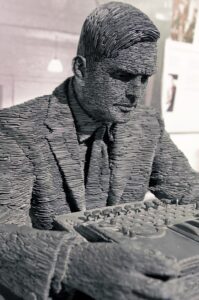Humanist Profile: Alan Turing
 Alan Turing statue at Bletchley Park, UK (Photo by Antoine Taveneaux via Wikimedia Commons)
Alan Turing statue at Bletchley Park, UK (Photo by Antoine Taveneaux via Wikimedia Commons) God has given an immortal soul to every man and woman, but not to any other animal or machine. Hence no animal or machine can think. I am unable to accept any part of this…
—ALAN TURING, “Computing Machinery and Intelligence,” Mind (October, 1950)
British mathematician, cryptographer, and computer science pioneer Alan Mathison Turing was born on June 23, 1912, in London, England. His parents, Julius and Ethel, had met in India, where Julius was employed in the Indian Civil Service. They returned to England for the birth of each of their sons (Alan was the younger) but lived mostly in India, leaving the boys largely in the care of a foster family during childhood and adolescence.
Starting at age thirteen, Turing attended the Sherborne School near Dorset, England, and exhibited a genius-level grasp of math and science. However, his obsession with those disciplines at a time when the humanities were strongly emphasized for the educated upper classes concerned his teachers. While Turing, who was gay, was known to be opinionated, moody, and socially awkward, he did form a very close friendship and intellectual connection with a fellow student named Christopher Morcom.
If Morcom was his first love, as is commonly believed, Turing never had a chance to tell him, as Morcom died of tuberculosis in 1930. The event devastated Turing and he began to think deeply about the question of mind over matter, wondering, in letters written to his dear friend’s mother, about whether a mind could live on after the body died. This notion would later develop into the question of whether a machine could be developed that could think.
In 1934 Turing graduated from King’s College, Cambridge, having flourished as a mathematician and also as a long-distance runner. Two years later, as a graduate student at Princeton, he published his famous paper on computable numbers and the idea of an infinitely capable computing machine (later dubbed the “universal Turing machine” and widely regarded as the origin of modern computability).
During World War I, Turing famously led the team at the UK’s Government Code and Cypher School at Bletchley Park that cracked the German Enigma code. Their secret work intercepting and decoding the details of planned attacks by the Germans is believed to have shortened the war by several years.
After the war, Turing continued his work in computer science. In 1950 he published a paper in the British journal Mind, where he posited that in fifty years programmable computers would be able to mimic the human mind. In refuting arguments to the contrary, Turing summed up the brief “Theological Objection” section saying, “I am not very impressed with theological arguments whatever they may be used to support.”
The details of Turing’s tragic death are as well known as those of his life. In 1952 he was convicted of gross indecency for homosexual acts and, instead of going to prison, chose to undergo chemical castration via estrogen injections. Turing died on June 7, 1954, from cyanide poisoning in what was ruled a suicide.
Alan Turing has received countless posthumous tributes for his cryptanalysis and for his other contributions to math and science. In 2009 an official government apology was issued for the “appalling” treatment Turing received after his arrest, and in 2013 Queen Elizabeth pardoned his conviction. Turing’s story was the subject of the Academy Award-nominated 2014 film, The Imitation Game, starring Benedict Cumberbatch, who in 2015 joined the campaign to pardon the estimated 49,000 other British men convicted of gross indecency for homosexual acts, some 15,000 of whom are still alive and on record as criminals.
